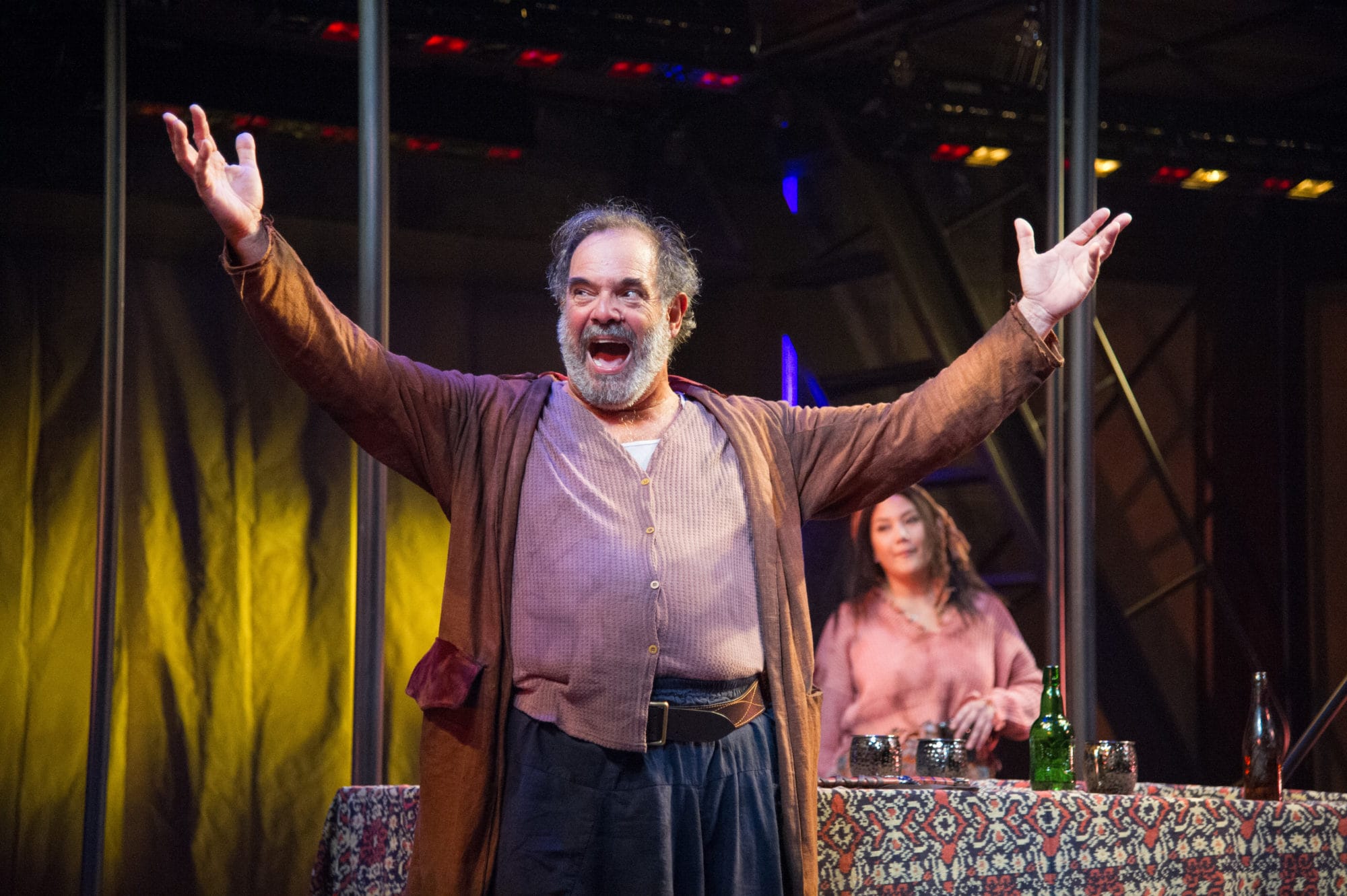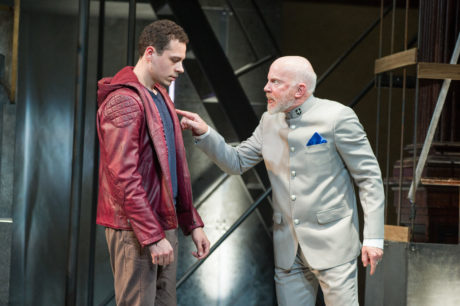1 Henry IV at the Folger Shakespeare Theatre, directed by Rosa Joshi, is perfectly cast and beautifully executed. Edward Gero is a superb Falstaff, and he is surrounded by gifted actors and strikingly vivid production values. 1 Henry IV was the major text for Orson Welles’ 1965 film, “Chimes at Midnight.” Gus Van Sant’s 1991 movie, “My Own Private Idaho,” with Keanu Reeves and River Phoenix was also loosely based on the play.

The success of any 1 Henry IV production rests largely on the character of Falstaff, whose scenes are works of comic genius. Fortunately, in Edward Gero, Folger has found a Falstaff whose performance is the epitome of great acting. He is ably supported by a cast who display humor, zest, and, when called for, military fervor.
At the outset, King Henry IV (Peter Crook) is in an anomalous position. He is responsible for the deposition and murder of the previous king, Richard II, and at one point planned a crusade to assuage his guilty conscience. Now, due to civil unrest, he will have no time to fulfill his promise. Crook’s King Henry believes he has been too soft in the past and is determined to assert his authority. Other characters subtly undermine his power by referring to him as “Bolingbroke” or “Lancaster.”
To add to his troubles, his son Prince Hal (Avery Whitted) is preoccupied with criminal antics, led by Falstaff (Edward Gero), a substitute father figure who is witty, unprincipled, and one of the most beloved comic characters in Shakespeare. Famed 19th-century critic William Hazlitt (1778-1830) said of Falstaff, “He carves out his jokes, as he would a capon, or a haunch of venison, where there is cut and come again; and pours out upon them the oil of gladness.”
Falstaff and Hal exchange ripostes with relish:
Falstaff: An old lord of the Council rated me the other day in the
street about you, sir, but I marked him not, and yet he
talked very wisely, but I regarded him not, and yet he
talked very wisely, and in the street, too.
Prince: Thou didst well, for wisdom cries out in the streets
and no man regards it.
Falstaff: Oh, thou hast damnable iteration and are indeed able
to corrupt a saint.
In a red Lord of Misrule hat, Gero’s Falstaff sits atop a table, pretending to be Henry IV while Whitted’s Prince Hal plays himself. He intones his admonitions to the Prince with delicious faux-indignant gusto. He gives us three levels of meaning: Falstaff’s; King Henry’s; and a sly actor’s commentary on both roles. His Falstaff is not only hilariously funny, but sometimes rageful, and sometimes touching. It’s easy to agree with him when he says wistfully: “Banish plump Jack, and banish all the world.”
Whitted as Prince Hal begins as the fun-loving protégé of the reprobate Falstaff and makes a difficult transition to devoted son and purposeful warrior. He is in a way re-enacting his father’s rebellion. But it can be argued that his experience of life with the ordinary people of England will ultimately make him a much better ruler.

Peter Crook as King Henry IV enacts the many moods of the role with skill. His kingly anger at Henry Percy (“Hotspur”) for refusing to deliver prisoners to him after a battle, has all the self-righteousness of a person who fears he may be in the wrong. In fact, the King admires Hotspur (Tyler Fauntleroy), going so far as so wish he were Henry’s son instead of the rebellious Hal. Crook’s journey from rejection of Hal to acceptance and ultimately admiration is a moving one. Fauntleroy as Hotspur offers a portrait of a fierce and warlike leader, in love with his wife Lady Percy (Mirabel Martinez), but even more in love with the alarms of war. Lady Percy is a lively female role, one of the best in Shakespeare, and Martinez performs it with élan.
The comic scenes are full of original touches. Apart from Falstaff, there is Poins, played delightfully by Jazmine Stewart, with long braids and ripped pantyhose. Todd Scofield is a richly comic Bardolph. Kate Eastwood Norris as Mistress Quickly is unusually attractive and stands up to the men with style. The company of revelers are fearfully and wonderfully dressed (costumes are by Kathleen Geldard) in colorful, dizzyingly varied attire. Every member of the company–Poins (Stewart), Bardolph (Scofield), Mistress Quickly (Norris), Peto (Sam Midwood), and the thief Gadshill (Alex Michell)–is excellent.
The rebels, Worcester (Naomi Jacobson), Mortimer (Maboud Ebrahimzadeh), Northumberland (U. Jonathan Toppo), Hotspur (Tyler Fauntleroy), Douglas (Sam Midwood) and Glendower (Toppo again) have a range of scenes, from hard-fought battles to conspiratorial dialogues. Glendower is one of the most unusual characters; he claims that he can “call spirits from the vasty deep” to which Hotspur retorts “Why, so can I, or so can any man; but will they come when you do call them?” Maboud Ebrahimzadeh is stoutly loyal to his King as Blunt, as is Hal’s younger brother Prince John (Alex Michell). Todd Scofield as Westmoreland seems to be the ideal “right-hand man.” Each actor in these supporting roles has a unique and captivating interpretation.
The sound and music (Original Music and Sound Design are by Palmer Hefferan) are simply spectacular. There is a lovely song by the Welsh-speaking Lady Mortimer (Jordan Lee), ominous orchestration, and loud blasts during the battles. The lighting design is stunning; sometimes there is darkness, punctuated by mysterious lights; at other times there are fluorescent lights in different colors. Lighting Designer Jesse Belsky utilizes red light for the warfare scenes, and a mixed palette for others. Sara Ryung Clement’s Scenic Design is eye-catching, and carefully constructed to accommodate the diverse locations. Alice Gosti, Movement Director and Choreographer, presents a multiplicity of exhilarating scenes. U. Jonathan Toppo, besides being one of the actors, is the Fight Choreographer, and the fights are full of action. There were times when I was really frightened! Special mention is due to Dramaturg Michele Osherow; the cuts are extremely effective, and the play is much less confusing because of them.
Director Rosa Joshi is co-founder of Upstart Crow Collective, a women’s group who specialize in classical theatre. Jazmine Stewart (Poins), Naomi Jacobson (Worcester) and Kate Eastwood Norris (Vernon) give vibrant performances in men’s roles. There is a debate about whether this can be successful: but in any kind of nontraditional casting, our imaginations are expanded. Surely this is what Shakespeare is all about.
Running Time: Two hours and 40 minutes, including one 15-minute intermission.
1 Henry IV plays through October 13, 2019, at The Folger Shakespeare Theatre, 201 East Capitol Street SE, Washington, DC. For tickets, call (202) 544-7077 or order online.




